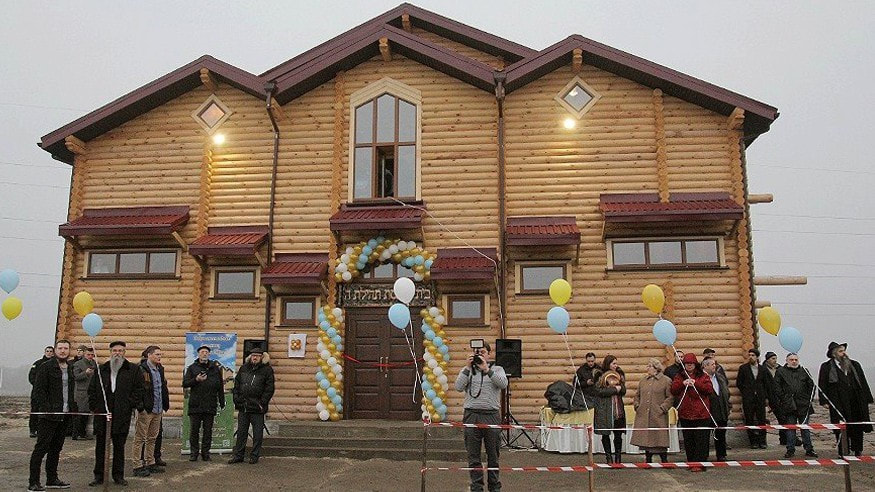|
The tiny settlement of Anatevka is a pretty interesting place. Located just outside the Ukrainian capital Kiev (Kyiv), it is a rare example of a modern-day shtetl, built for Jewish refugees fleeing the war in Eastern Ukraine. It’s also an attempt to revive the Jewish communities and way of life that existed in these parts before they were torn apart by pogroms and, later World War II.
If the settlement’s name sounds familiar, that’s because Anatevka was also the fictional home of the iconic Yiddish writer Sholem Aleichem’s most famous character – Tevye the Dairyman in Fiddler on the Roof. Bizarrely Anatevka has become interesting for another reason too: it is playing an unlikely role in the impeachment story of President Donald Trump. Anatevka was founded in 2015 by Rabbi Moshe Azman of Kiev, a large burly man with a bushy beard, and an ardent Trump supporter. In its early days, the nascent village was built almost entirely of wood, as so many Eastern European shtetls were, with a three-storey wooden synagogue including two mikvahs (ritual baths), a residential block with 20 apartments and a shared kitchen. A brick-built school, apartments, a clinic and an orphanage soon followed. The facilities are built largely by local residents – builders, carpenters and tradespeople who were forced out of their homes by gunfire, rockets and bombing in cities like Donetsk, Lugansk and Mariupol – who earn a small salary for their work. Those without building skills take on other roles like preparing food, working in the school or looking after the synagogue. Rabbi Azman used his own money and funds raised from private donors to create not just a refugee centre but a living, breathing community based on Yiddishkeit and self-reliance – a spiritual as well as physical revival of the shtetl. The village continues to rely on donations, mostly from the US. “I’m in debt to my eyeballs, but I’m not afraid because this is God’s mission. Besides, each day that Anatevka is running is another day that my community lives in dignity. Builds a future. You can’t put a price tag on that,” Azman told The Times of Israel in 2016. Around 30 families now live in Anatevka, and some 200 pupils attend school there, the majority from Azman’s old community in Kiev. A high fence surrounds the village and entrance is through a brown, metal gate with military guards. Not everyone here is a practising Jew, indeed several are not Jewish at all but have a Jewish wife or husband. The majority of Jews who fled Eastern Ukraine are secular. “We don’t force anyone to become a practising Jew,” Azman says. But there are rules people must obey if they want to live in Anatevka. In public, all residents must respect the Sabbath and dress modestly, although behind closed doors they are permitted to do as they like. So how did this tiny Jewish community become embroiled in a political scandal half way across the world? Bizarrely, Anatevka’s honorary mayor is none other than embattled Trump lawyer Rudolph Giuliani. The settlement found itself at the centre of an aborted effort to get the former mayor of New York to come to Ukraine in May for a meeting with Volodymyr Zelensky, then the president-elect, whom he planned to push for investigations that would help President Donald Trump politically. Giuliani’s associates Lev Parnas and Igor Fruman are board members of the American Friends of Anatevka, a charity raising funds for the village. They allegedly introduced Giuliani to several Ukrainian officials as part of a pressure campaign to convince Ukraine to investigate Hunter Biden, the son of former vice-president and 2020 presidential candidate Joe Biden. Parnas and Fruman stand accused of funnelling money, much of it allegedly of foreign origin, into Republican campaigns in the US. Both pleaded not guilty on 23 October to four counts of campaign finance violations in a federal court in New York City and are now awaiting trial.
0 Comments
Leave a Reply. |
Keeping stories aliveThis blog aims to discuss historical events relating to the Jewish communities of Ukraine, and of Eastern Europe more widely. As a storyteller, I hope to keep alive stories of the past and remember those who told or experienced them. Like so many others, I am deeply troubled by the war in Ukraine and for the foreseeable future, most articles published here will focus on the war, with an emphasis on parallels with other tumultuous periods in Ukraine's tragic history. Archives
March 2024
Categories
All
|

 RSS Feed
RSS Feed
